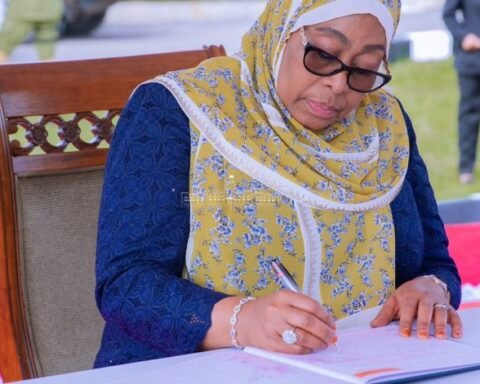A group of researchers from the University of Dodoma (UDOM) has created a new artificial intelligence (AI) platform designed to help identify early signs of mental health disorders and guide individuals to professional support.
The system, dubbed Akili Check, is currently being piloted at four key referral facilities: Muhimbili National Hospital, Benjamin Mkapa Hospital, Mirembe Psychiatric Hospital, and Amana Hospital.
Speaking during the ongoing 49th Dar es Salaam International Trade Fair (DITF), lead researcher Mr. Kukwa Malyango explained the inspiration behind the project. “Mental health is often neglected until it becomes severe. We built this platform to provide early screening, which can prevent worsening conditions and allow for timely treatment.”
A Digital Tool With a Human Touch
Akili Check enables users to evaluate their mental wellbeing by completing a brief self-assessment based on standardized psychological indicators, such as mood fluctuations, stress levels, and sleep patterns. These evaluations are rooted in globally recognized models like the Patient Health Questionnaire (PHQ-9) and the General Anxiety Disorder scale (GAD-7).
Depending on the user’s score, Akili Check provides practical mental health support strategies and, where necessary, recommends professional evaluation. Health workers using the platform also benefit from its AI-generated suggestions for clinical decision-making.
Since the start of the pilot, over 200 people have been diagnosed and connected to care. According to hospital staff, the tool has already shown its value in reducing waiting times and easing the diagnostic burden in high-traffic psychiatric units.
Tanzania’s Mental Health Crisis
Tanzania, like many other low- and middle-income countries (LMICs), faces an uphill battle in managing mental health. The country has fewer than 1 psychiatrist per 500,000 people and persistent societal stigma makes many reluctant to seek help. Common mental health conditions such as depression, anxiety, bipolar disorder, and post-traumatic stress disorder (PTSD) remain largely underdiagnosed.
A 2023 study by the Mental Health Tanzania Initiative noted that more than 70% of Tanzanians experiencing mental health symptoms have never been screened or received treatment.
“This is why digital platforms like Akili Check are so important,” said Prof. Razack Lokina, Deputy Vice Chancellor for Research at UDOM. “They are breaking barriers and creating access in places where services were traditionally out of reach.”
Also Read; Trump to Host African Presidents for Economic Dialogue
At present, Akili Check is available on smartphones and computers. However, recognizing the digital gap in many rural and marginalized communities, the team is adapting the system for USSD-based feature phones. This version will allow users with even the most basic phones to take part in mental health assessments without needing internet access.
Efforts are also underway to integrate Akili Check into primary healthcare systems, school wellness programs, and community-based youth support networks.
“We are working closely with COSTECH to support national scaling,” Mr. Malyango added. “This platform is designed to serve not only urban centers but also villages where awareness and access are minimal.”
Looking ahead, the team at UDOM’s AI for Public Health Laboratory is exploring further applications of artificial intelligence in fields such as telepsychiatry, drug discovery for mental illness, and predictive analytics in suicide prevention and crisis intervention.
Their goal is clear: build a Tanzanian-led healthtech model that can be replicated across Africa, using local language support, culturally informed content, and open-access design.







